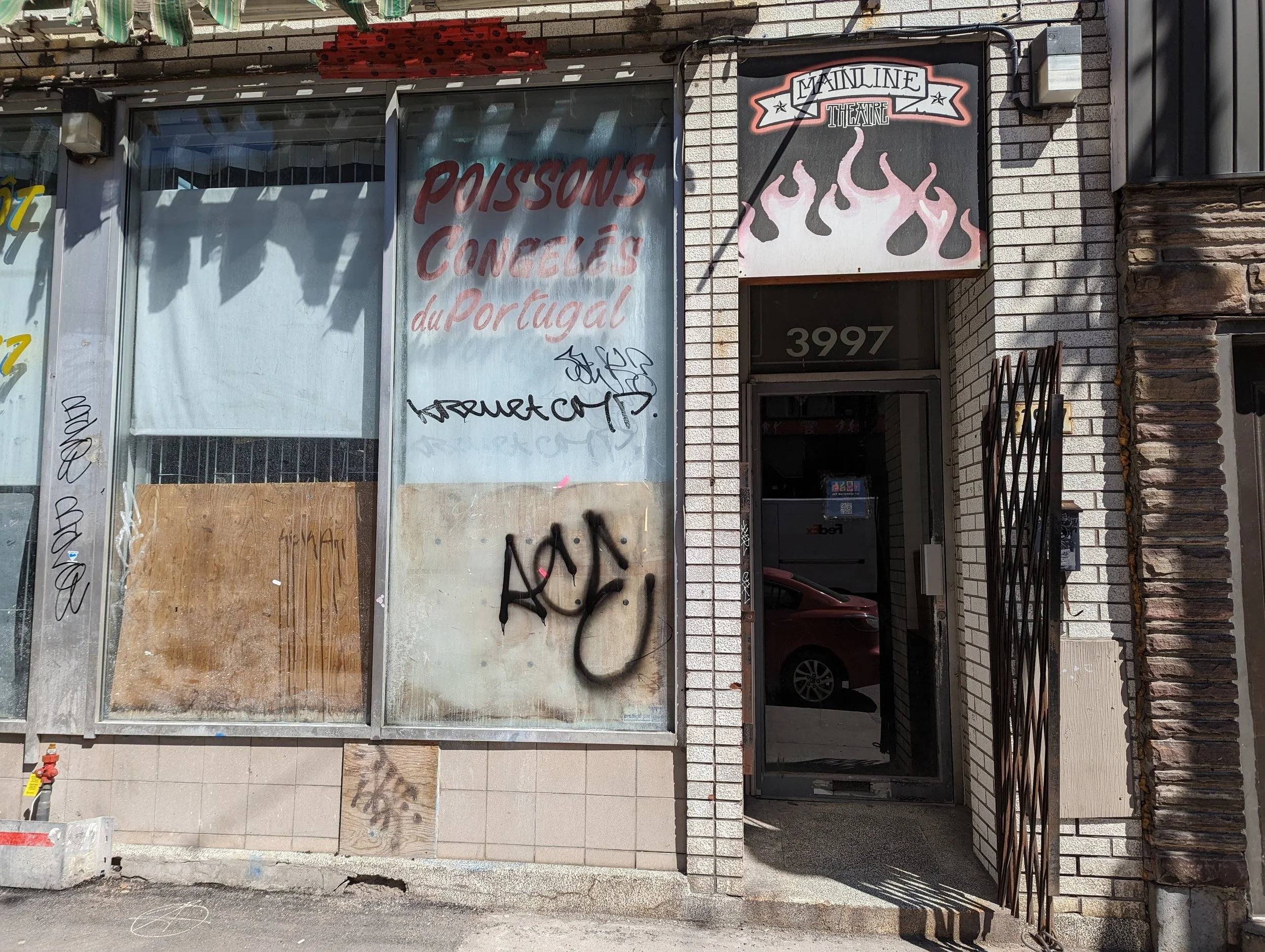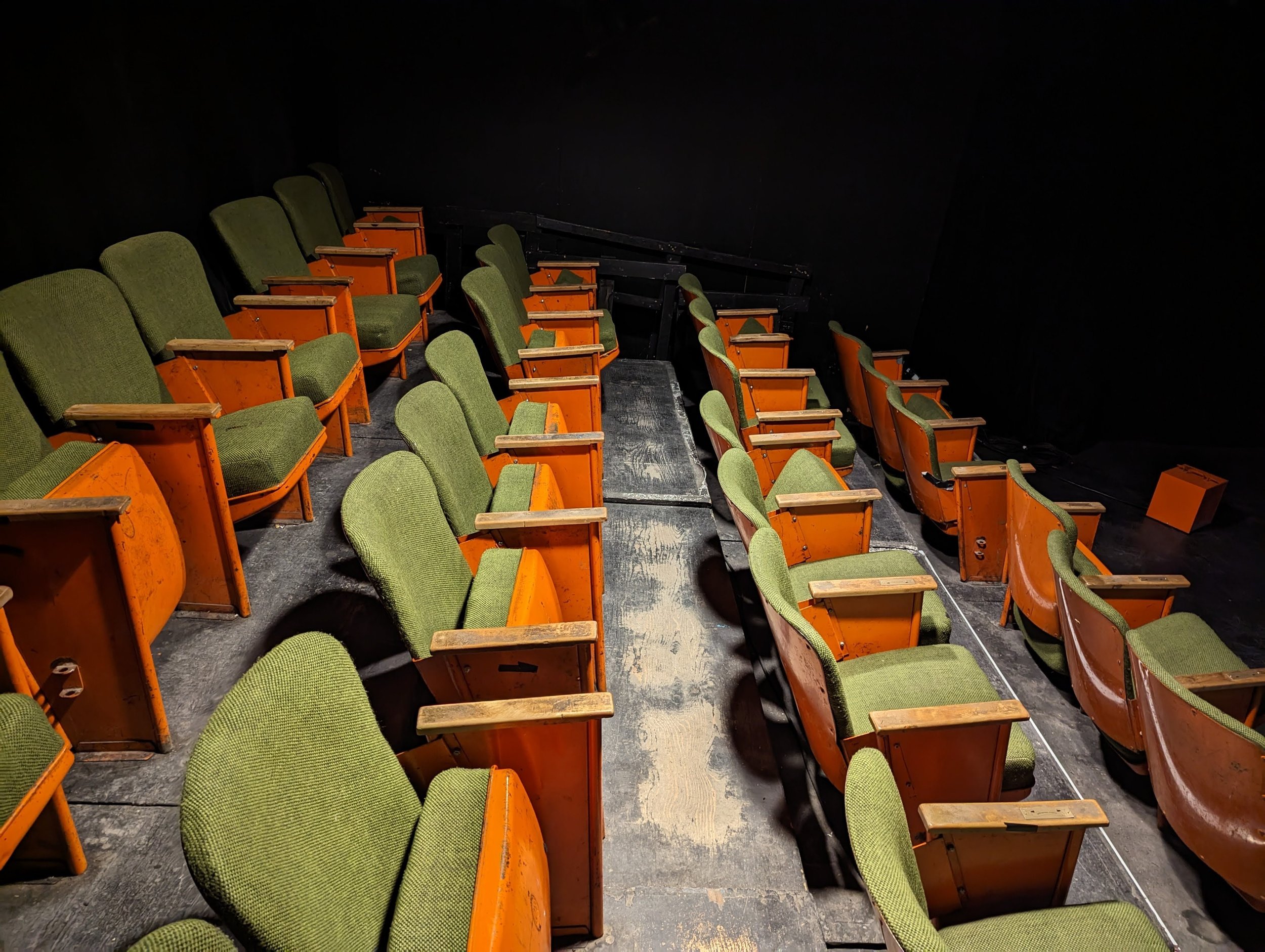Mainline Theatre - MTL Venue Series
The Montreal FRINGE Festival Corporation was founded by Kris Kieren and Nick Morra, and incorporated in 1991. In 2000, the company’s name was changed to the MainLine Theatre, allowing for year-round productions. Most importantly, MainLine’s venue, situated above Segal’s grocery store at St. Laurent and Duluth, opened in 2005 as a centre for the city’s English theatre community. Today the MainLine has evolved into an inclusive, multidisciplinary space for emerging and established artists alike. The space also serves as the headquarters for the St-Ambroise Montreal FRINGE Festival. My first experience at the MainLine was in 2017 to see City Boy by Kenny Streule.
Kenny, is now the Artistic Producer of the MainLine, presently tasked with managing rentals, overseeing the Fringe festival, and realising the vision of Artistic Director Amy Blackmore. He looks at me with kind eyes and explains the music which reverberates through the theatre while we speak. “Danse Cité has rented the space to do residencies. When you couldn't have an audience, we figured we had to remain a venue that still was operational throughout the pandemic, so we shifted over to residencies. We focused more on helping artists develop the show, so that when we got the greenlight to open up, they could then move forward.” Kenny speaks passionately. I am lost in memory…
“You’ve never been here before?” My friend beside me stomped out her cigarette onto St. Laurent Blvd before leading me and another student under the flaming yellow sign and up the narrow carpeted steps. An open red door awaited us. “I guess it couldn’t be avoided any longer.” She smiled at me, and stepped through. We three had spent the afternoon rehearsing a scene from Betrayal. How could this hole in the wall be a theatre? I wondered.
“Folks who come in here who don't know the space look at it like, ‘Where are we? This is the weirdest place,’ and it's such a beautiful moment to see them realise that they're in a theatre space. Shows can happen pretty much anywhere, you know, people don't expect to find MainLine above a grocery store. But here it is. There are so many beautiful things that are created here.”
Eager guests sipped on quiet conversations as my friends and I made our entrance. Colourful posters and lights hung from the walls, everything incandescent. A pair of mannequin legs were spread over the ticket counter. An old piano occupied a section of wall. Beside a sunken couch sat an antique television with MAINLINE printed across the screen. The air crackled with enough creativity to make my hair stand on end. Could this be it? I wondered. A moment of vitality? A feeling of oneness? Why else would people pack themselves like drunken sardines under a low gridded ceiling to watch four poor thespians sweat uncontrollably for 90 minutes? Am I just really horny? So there we sat, blocks away from where Cohen had lived and wrote, up the street the highschool of Richler, and where my Zaidy grew up.
“We listen to the needs of our community, so we find ourselves always evolving with our community and trying to really support them.” Along with their workshop series for artists skills such as grant writing, MainLine is also one of the city's most affordable venues, making it the go-to for budding dance and theatre companies. “I think that's what makes us a part of the ecosystem is that we're not doing a season you have to subscribe to. We welcome everyone and we're here for the artists.”
“Art needs space to move forward to become something critical,” Kenny explains to me. “Oh, actually, this doesn’t work, or, I wrote this and it doesn’t work. You have to feel it out. You’re doing what approaches you.”
I liked Kenny’s show. The story of a gay man returning home to his rural family for his sister's wedding. Kenny says it’s about his cousins. Unbeknownst to me, the friends I was with had sex the night before. I hadn’t had sex with either of them yet, but that would change a few days later. Something about the inherent exhibitionism of theatre is accentuated at the MainLine - unless that’s just the residual vibrations of their famous Rocky Horror productions built up over 10 consecutive years. Maybe it was the Strip Spelling Bee that Kenny is telling me about which hadn’t happened yet, communicating its essence through me, backwards in time. An energy that always lives here. I wonder if I had proposed a threeway with my two friends, would it have happened?
“I've always seen MainLine as the home of indie theatre...[I]n the sense that shows can start here and then move forward elsewhere. A few years ago, Tableau D’Hote put on Hosanna, the Michel Tremblay play, and it was absolutely beautiful… then the Centaur [Theatre] picked it up and put it in their season. I think that the beauty of it is that MainLine’s a part of that.” Pride simply radiates off of Kenny. This guy can vamp. I’m not surprised at all when he tells me he began working for the MainLine after performing an improv show here.
The weekend after City Boy, I returned to MainLine to see Late Company by Jordan Tannahill. Tannahill, whose book Theatre of the Unimpressed I adored, had attended a highschool near mine. He was a beacon of hope for me. I met him once at a talk he gave when visiting Montreal in January 2019. I wanted to ask him about the vital theatre he claimed could exist anywhere, not held hostage by the commercial theatre or academia. I wanted to tell him that I knew a place where this groundbreaking art was being made. Nervously, I told him I’d seen his play at the MainLine! He seemed confused a moment before continuing to sell me his latest book. So much for the future of theatre. But Kenny has other thoughts:
“How do we welcome folks who don’t theatre the way we theatre?” Kenny asks me. I’m not sure if it’s rhetorical. He continues, “We do theatre in a very European way: you show up, you get signed in, you go in, you sit down and you watch it. But is that how Indigenous artists tell their stories? Is that how BIPOC artists tell their stories? We need to figure out how to be more welcoming, and you can’t just say ‘I’m welcoming to everyone’. You need to do your research and understand what the actual needs of people are. I hope that’s what the theatre community is going to do, I hope we’re all gonna do our homework and not just check a box so that we get the granting funds to put on a show and ‘Oh that’s my BIPOC show.’ I hope institutions are able to say we want these shows, and invite the audience who doesn’t come to our theatre to come see it. We need to refresh our audience.”
I performed in 4.48 Psychosis, directed by a McGill grad student who decided that this amorphous, structureless, characterless, depression piece would be her first rodeo. It was, of course, at the MainLine. Hearing every word of the audience from backstage, I tried to stay focused. Could this be it? A real event? A glimpse of god? An epiphany? My friends sat in the front row for maximum emotional support. Afterwards they patted me on the back as we walked silently down the narrow stairwell. “Oh cheer up, it’s done now” they said and I nodded, saddened that in the heat of acting nothing spiritual had happened to me. Not even as I was stepping off a table with blue lights going black. Expressionistic portrayal of a postdramatic suicide.
“Let’s go to Biftek. I wanna play pool.” I said to my friends as I stepped out onto St. Laurent and lit a cigarette, starting to walk down the hill, away from Leonard Cohen, away from my plateau apartment, away from the MainLine, the magic of life, and the disappointment of it, too. I knew that it would not be long before I found myself again in the intimacy of that inconspicuous theatre, drinking the anxious sweat of amateur performers, still longing to be seen.
Photos by Aidan Cottreau



